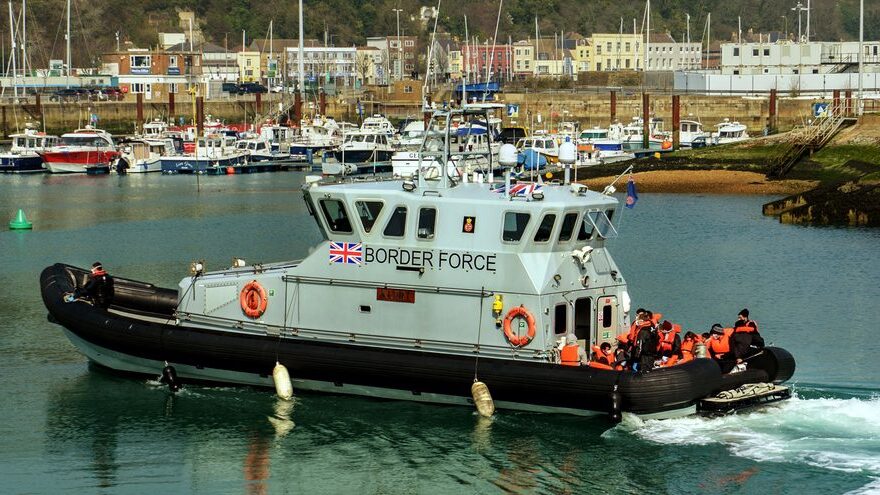
Migrants arriving at the port of Dover with Border Force officials after being rescued at sea in the English Channel.
Photo: Sean Aidan Calderbank / Shutterstock.com
The plan to send illegal migrants to Rwanda has hit yet another stumbling block after the British court of appeal ruled it unlawful.
This so-called ‘Rwanda Plan’ has been a disaster from the start. In return for agreeing to house “some” migrants who arrived illegally in Britain (most likely by crossing the Channel from France), Rwanda received £120 million (roughly €140) from the UK government. Ministers also agreed to pay for the processing and integration costs for every relocated migrant and for Britain to take on an “unspecified” number of migrants from Rwanda in return.
So far, zero migrants have been resettled in Rwanda. The first flight was set to depart in June last year, holding fewer than 10 people, but this was cancelled after legal action.
The Court of Appeal this week voted by a majority of two to one that the plan was unlawful. The justices behind the ruling said there was a risk that those relocated to Rwanda could be sent back to their home countries:
there are substantial grounds for believing that there is a real risk that the asylum claims of RIs [relocated individuals] may be wrongly refused. On the face of it, it would appear to follow that there was a real risk of them being refouled. Where an asylum seeker’s claim is rejected the country in question will typically require them to leave the country (in the absence of any other basis on which they might claim residence), and since they will have been found to be at no risk in their country of origin, there is no reason why they should not be returned there; and even if they are in the first instance returned to some other country that does not exclude the possibility of indirect refoulement.
Prime Minister Rishi Sunak is “positive” that the ruling will be overturned, according to The Daily Telegraph. He sees the plan as important for one of his five pledges, “to stop small boats, making sure that if you come to this country illegally, you are detained and swiftly removed.”
But critics say the ‘Rwanda plan’ would do next to nothing to affect the number of Channel crossings even if it was in full operation. Panellists at an event hosted this week by The European Conservative agreed that European governments ought, if they really want to get a handle on illegal migration, to focus on strengthening borders rather than simply responding with threats of deportation once thousands have already arrived.
Illegal #immigrants get free healthcare, housing, and cash—that is no #deterrent, but an open invitation to the UK and the EU, said businessman and former Brexit Party MEP @benhabib6. #apathforward #EUnewshttps://t.co/40IXUzikFn
— The European Conservative (@EuroConOfficial) June 29, 2023
Responding to the Court of Appeal’s ruling, businessman and former Brexit Party MEP Ben Habib told The European Conservative:
The theory that the threat of deportation to Rwanda would deter people from crossing the Channel is fundamentally mistaken. It will not. Anyone determined enough to make the journey across the Channel will not stop for fear of the remote risk of being deported.
Even if Rwanda was working in full swing, it could not accommodate more than a few hundred, perhaps thousands of deportees. The odds of being one of the unlucky ones are much much lower than the odds they had already taken on to reach the beaches of France. It is no deterrence at all.
And the notion of a deterrent is entirely undermined by the treatment they get the second they enter British territorial waters. They are ushered onto our Border Force taxi boats, given a life vest and warm blanket, assured safe passage to Kent and thence to hotels where they receive free lodging, food, health and dental care and even cash to spend.
We might as well have “All Welcome to England” signs plastered up and down the French coast.
“The answer,” he added, “to stopping the boats is to stop them—in the Channel and send them back to France. Unless and until we discover the backbone required to enforce our borders, the UK will have borders open to anyone prepared to hop on a dinghy.”
